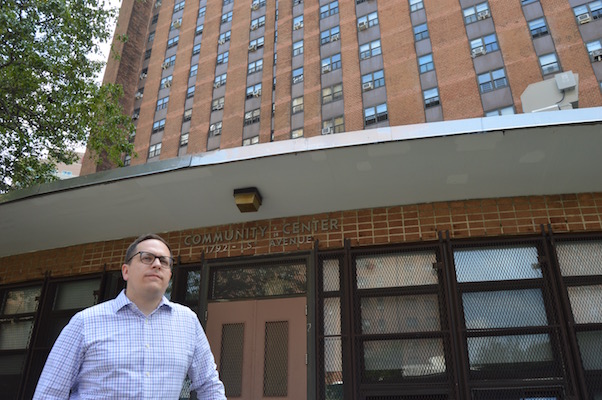
Wariness the Watchword Among NYCHA “Infill” Advisory Committee Members on UES
June 30, 2016
BY JACKSON CHEN, Manhattan Express
The New York City Housing Authority has created an advisory committee of residents, organizational representatives, and elected officials as part of its plan to “infill” new private housing at the Holmes Towers public housing project. But the Upper East Siders invited to provide community input while sitting at the table are unsure if the committee will lead to a positive outcome for them.
NYCHA’s plan for Holmes Towers, located between 92nd and 93rd Streets east of First Avenue, includes the removal of a playground to make room for two 25-story developments that will consist of a 50-50 split of market rate and affordable housing units. This first of two NextGen Neighborhoods projects planned by NYCHA — the other being Wyckoff Gardens in Brooklyn — would help generate revenue to offset the agency’s huge budget deficit. Part of the promise made by the agency is that income will also be applied to provide much-needed repairs to the existing public housing units.
From the time the NextGen project was first announced and through subsequent meetings with Holmes residents, the plan has drawn considerable opposition as those living there expressed concerns about disruptive construction, overcrowdedness on the site’s open space, and who would actually profit from the development of private housing there.
To alleviate those concerns while incorporating community input, NYCHA formed the Stakeholder Committee for Holmes Towers made up of nine residents — one of whom is a Community Board 8 member and another the vice president of the Holmes Towers residents association — two community organizations, State Senator Liz Krueger, Assemblymember Robert Rodriguez, and Borough President Gale Brewer.
Shola Olatoye, NYCHA’s chair and CEO, in an interview with Manhattan Express late last year, emphasized that resident and community engagement has been at the forefront of planning for the agency’s NextGen program. According to a NYCHA spokesperson, the primary role of the committee members is to “represent the interests of the residents and share information amongst residents, community members, and the developer.”
But the so-called stakeholders aren’t completely sold on the expected effectiveness of the committee organized by the agency.
“They weren’t too clear on what they’re expecting from us,” said Yolanda Cancell, one of the committee members. “They just wanted our representation there so we can help relay some of the information to our tenants.”
The Holmes Towers resident said she applied to the committee after NYCHA announced it earlier this year with the hope that she would be able to better communicate with the agency and get new information straight from the source.
“The reason why I joined is to know what’s going on with this NextGen project they’re working on,” Cancell said. “I just wanted to find out first hand.”
While she’s hopeful that the residents will be able to interact with the developer and eventually come to compromises over disputed issues, Cancell is not clear about her role as a member and what to expect from the committee’s efforts.
“[NYCHA officials] weren’t very specific, they didn’t really outline exactly what we were going to be doing,” Cancell said.
The wariness doesn’t end with Cancell, as an official from Stanley M. Isaacs Neighborhood Center, a community services organization headquartered at Holmes that is represented on the committee, also voiced uncertainty.
“The description of what the Stakeholders Committee will do is not formalized in a way that leads me to a place where I’m comfortable or confident,” Greg Morris, the center’s executive director, said, “that being part of this committee that we’re going to have an impact on the developer.”
Morris said he respects the city’s goal of creating more affordable housing, but explained that that the burden of providing that relief seems to be falling on underrepresented residents of Holmes Towers and the adjacent Isaacs Houses.
“The context here is that this is a community that feels pretty beat down in some ways,” Morris said. “Their feelings and their interests are not represented or respected.”
NYCHA is clearly hopeful that launching the committee will prove persuasive in demonstrating that “residents will continue to be actively engaged with their voices heard throughout the process,” but its newly appointed members are still holding out to see how much influence they will enjoy once the meetings begin.
Cancell said that NYCHA explained the committee is expected to meet for five or six hours a month. A NYCHA spokesperson said it would start convening this summer.
“At the end of the day, if this is going to move forward, the residents, other community stakeholders, and NYCHA need to see this as a long term effort to improve the lives of residents,” Morris said. “Not just to find space to build on because we can generate revenue to fill an enormous hole in the New York City Housing Authority budget.”
